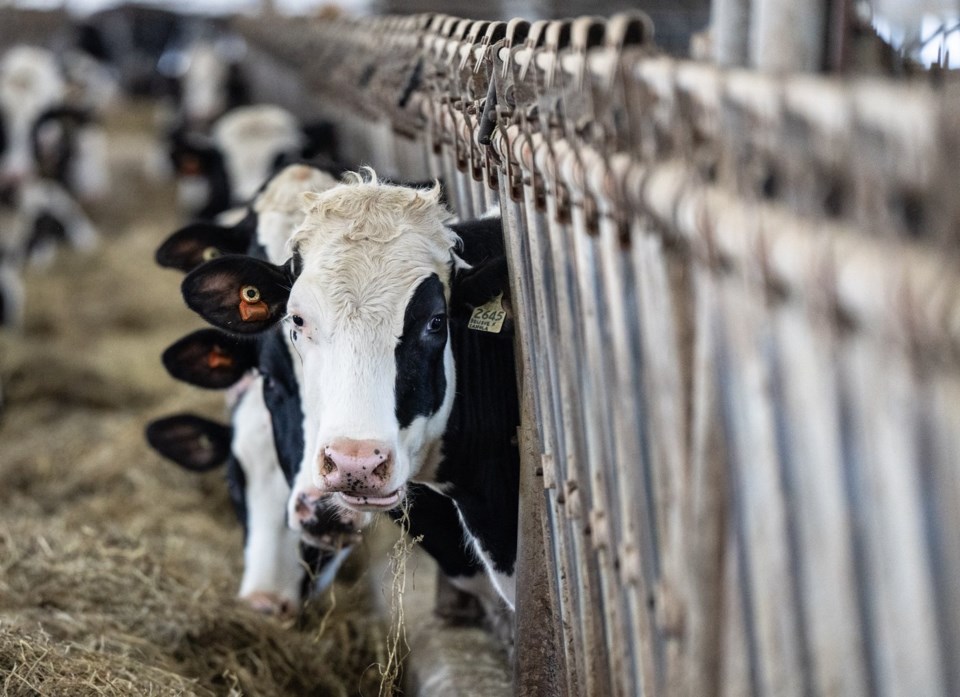OTTAWA — A Bloc Québécois bill to take Canada's supply management system off the table in future trade negotiations has passed swiftly through Parliament, with little opposition.
The Senate passed the bill through third reading Tuesday evening after the House of Commons pushed it through last week without opposition.
"We have won," Bloc Québécois Yves-François Blanchet told reporters in Ottawa on Wednesday.
"It's total ecstasy, it's joy," said Bloc Québécois agriculture critic Yves Perron, who introduced a motion to push the bill forward on June 5.
"There have been so many obstacles to this bill over the past six years. It's the culmination of many hours of work and negotiations," he added in an interview with La Presse Canadienne.
Supply management is the policy of controlling production of dairy products, eggs, chicken and turkey to prevent significant price fluctuations. Canada also imposes restrictions on imports of those products to keep prices stable.
American farmers have long sought access to a larger share of the Canadian market and have launched trade disputes about supply management under the Canada-United States-Mexico Agreement, also known as CUSMA.
New Zealand's dairy industry has also targeted Canada's system by launching disputes through the Comprehensive and Progressive Agreement for Trans-Pacific Partnership.
The bill, which now awaits royal assent, effectively prohibits Canada's foreign affairs minister from making any commitment in trade talks that would undermine the structures making supply management possible — tariff rate quotas and the tariffs applied to imports above those limits.
A previous version of the bill died when Parliament was prorogued earlier this year. Some senators attempted to amend that bill to exempt trade deals already in place.
The Bloc accused senators of sabotaging the bill at the time, though the amendments never made it to the floor of the Senate for a vote before Parliament was dissolved.
The bill was opposed by cattle and grain farmers who rely on international markets for their products. Kyle Larkin, executive director of the Grain Growers of Canada, accused parliamentarians of tying trade negotiators' hands.
"Despite the government’s stated commitment to growing Canada’s economy and expanding international trade, the first bill passed by the 45th Parliament restricts our trade negotiators’ ability to secure the best possible deals for Canadians,” Larkin said in a media statement.
"Parliament chose to prioritize one group of farmers over another,” added Scott Hepworth, the organization's acting chair.
“As a grain producer, I know firsthand how important international trade is to my family’s livelihood. Without reliable access to global markets, farmers like me are left behind."
Blanchet said the current bill benefited from universal support in the House of Commons.
"One of my MPs was saying this morning that there were people in our legislative institutions who said they would never pass a bill coming from (separatists)," Blanchet said in French.
Opposing the bill Tuesday night in the Senate, Sen. Paula Simons attacked the legislation as an assault on western Canadian farmers.
"It does seem strange to allow a separatist party to set Canada’s national trade policy to such an extent, and at the expense of western Canadian producers and agricultural exporters," she said.
"Separatist rhetoric in my own province of Alberta is, sadly, growing louder and more strident, with a small but zealous group of hardcore separatists exercising a disproportionate influence over provincial politics, and with some provincial leaders who ought to know better pandering to those separatist agitators for their own strategic reasons.
"It would be bitterly ironic indeed if, in a bid to keep Quebec separatists happy, we ended up playing right into the hands of the separatist lobby in Alberta and Saskatchewan."
— With files from La Presse Canadienne
This report by The Canadian Press was first published June 18, 2025.
Nick Murray, The Canadian Press



